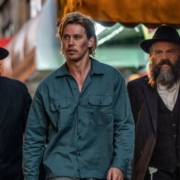What Is ‘Healthy Masculinity’?
By: Laura Bennett
What’s your definition of healthy masculinity?
Do you think societies reached a point where we’ve made it hard to define? Do young boys know how to be good men? And what that really means?
These are questions we’re all asking, as we continue to see changes in the way society responds to masculinity – and in the way we define ‘healthy masculinity’.
Director of the Center of Public Christianity, Simon Smart argues in his new book The End of Men that men need to be taught that “tender masculinity” is the answer to “toxic masculinity”. He sees boys falling behind educationally and socially, having higher rates of suicide and believes the messaging around masculinity has a big part to play in that.
It’s a nuanced conversation.
In a world where traditional definitions of masculinity are continuously challenged, the question arises: What does it mean to be a ‘good man’ today? Simon believes the answer lies in rethinking masculinity – and in broadening the ‘masculine ideal’.
Jesus: the perfect example of masculinity
Leveraging the example that Jesus set for all of us, Simon proposes a model of masculinity centered on vulnerability and service to others. This counters the toxic traits often associated with traditional masculinity, such as unemotional toughness and aggressive behavior. The idea here is not to eschew all aspects of traditional masculinity but to channel those inherent qualities—such as physicality and inquisitiveness—into positive outlets.
“Jesus’ life begins in incredible vulnerability as a tiny child ends on a cross in the most terrible circumstances,” Simon said. “And in between, he has all this sort of authority.”
Jesus “deploys whatever he had… in the benefit of other people rather than just themselves.”
“I reckon if we could develop a culture in which boys saw that as a thing to aim for, everyone would be served well by that.”
We need mentors
A huge aspect of this, he believes, is in mentoring and role-modelling.
“Young people need mentors and they need role models that are going to lead them in good directions,” Simon said and explained that the absence of healthy role models is having a huge impact on masculinity.
“You can’t just leave them to their own devices and think that it’ll all work out… we’ve got to be intentional about it,” Simon said and references Steve Biddulph’s belief that the “river of knowledge’ must be carefully and intentionally passed down through the generations.
Conflicting messages from social media, advertising and broader society is confusing many of our young men, as well as the many and varied conversations around toxic masculinity. This, Simon believes is causing detrimental outcomes in men such as higher rates of depression and social withdrawal, particularly among boys.
The collective effort of the community is indispensable in nurturing young boys’ development, Simon believes. Schools, clubs, and places of worship all play integral roles in offering a diverse, yet unified, spectrum of guidance and support.
“We need… a village, you need the community to be involved,” he said of raising young men.
And while positive mentors can have a great impact, negative mentors can have a detrimental effect.
“We’re seeing that boys are going to latch on to something that makes them feel better about themselves,” Simon said. “We want to make sure it’s going in a healthy direction.”
Love changes everything
“Getting people to think through the lens of love might change things markedly,” Simon said.
This ‘lens of love’, Simon says is a healthier guide for the behaviour and decision-making processes of young men. By seeing others as inherently valuable and acting in ways that prioritize their well-being, particularly in the realm of relationships and sexuality, this approach offers a counter-narrative to the objectifying and aggressive tendencies prevalent today.
“If you think about something like sexuality and pornography… getting people to think through that lens might change things markedly,” Simon explained.
This perspective not only benefits interpersonal relationships but also fosters a more empathetic and socially responsible generation.
“I think we would make a huge difference in a whole lot of things by emphasizing the preciousness of the other person.”
Article supplied with thanks to Hope Media.
Feature image: Supplied
About the Author: Laura Bennett is a media professional, broadcaster and writer from Sydney, Australia.




